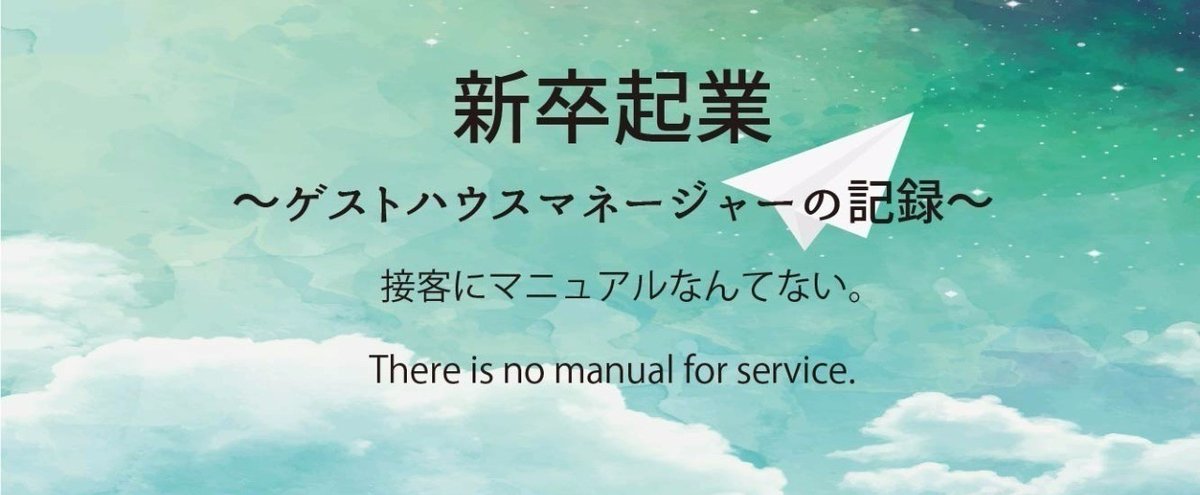
接客にマニュアルなんてない。~There is no manual for service. ~
日常の中で接客を意識することが多々あります。
接客の方法は様々で最高のおもてなしを心がけている人、友人のような関係性を築こうとする人。
様々なタイプがあります。
そんな中で僕が日常の中で気になるのは、「目も合わせずに接客を機械のように行う人」です。
はっきり言って誰のために何のためにやっているのか理解不能。
お金を稼ぐための一つの手段として、そこで働き給与を得ていることは重々承知ですが、それにしても酷すぎるなと思います。
それこそそんな接客だったら人間がやる必要はない。
早く機械に任せてしまえばいいのにと、その現場に対し心の中で終始毒を吐く始末です。
そんな感情が芽生えたので、今回は僕がゲストハウスwaya, yuyuにくるゲストに対して、接客の際に意識していることを書いていこうと思います。
①目を見て笑顔で接する
当たり前すぎることですが、これができていない人が多いです。
まず目を見ることのできない人が多すぎます。
その理由が緊張なのか、恐れなのかはわかりませんが。
コンビニなどにも多くいますが、目を見ないで下を見て、お金を片付けながら「ありがとうございました」と低いトーンでいう人。
「誰に言ってんの?」
素朴な疑問が頭をよぎります。
コンビニは人が良いとか悪いとかという理由で利用するわけではないので、接客の質を上げる必要は確かにないのですが、それでもやはり利用する側としては気持ちよくはありません。
(コンビニで働くすべての人がそのような人ではないですし、コンビニだけでその現象が起こると思っているわけでもありません。あくまで一例です。)
対して宿泊業というのは、サービスや施設の質の高さはもちろんなのですが、「その人にまた会いたい」と思ってもらえるかどうかが、リピートしてもらえる要素として重要なパートを占めます。
目を見て笑顔で接するだけでも、利用する側としての印象はすごくよくなります。
②3つのマジックワードを意識する
これは宿泊業よりの話によってしまいますが、僕はゲストに対してよく尋ねる3つの質問があります。
元気?
どこ行ったの?
どうだった?
この3つの言葉は至ってシンプルです。
しかし、この3つの言葉をかけることで以下のことが把握できます。
1, ゲストの体調はどうか
2, 満足のいく観光だったか
3, 積極的に会話をしたいか
1, ゲストの体調はどうか
複数の人が同じ場所に泊まるので、体調が良い人がいれば、悪い人もいます。
日本に来た海外の人にとっては、慣れない環境ということもあり、体調を崩しやすい傾向にもあります。
そんな中、「元気かな?」の一言があれば、その人の体調把握ができますし、その言葉に「体調が悪かったらいつでも言ってね」と添えるだけで、ゲストとしては安心感を抱きます。
「元気ですか?」
1つのマジックワードとして、多用しましょう。
2, 満足のいく観光だったか
人によって何を求めているかというのは変わってきます。
レストランで美味しいご飯を食べたい
自然に触れたい
アクティビティをしたい
面白い人に会いたい
それぞれのゲストが何を求めているかを把握するために、「どこに行ったの?」「どうだった?」という言葉はとても役に立ちます。
行った場所とその感想を聞けば、何が好きなのかを知ることができます。行った場所が気に入っていれば、似たような場所を他にも紹介できますし、その場所が気に入らなかったのなら、その人がどんな場所や体験を望んでいるかをヒアリングして、新しいオススメの場所を伝えることができます。
「札幌での時間をかけがえのないものにしてほしい。」
僕はその思いを持ってきてくれるすべての人に接しています。
「どこ行ったの?」「どうだった?」
とてもシンプルなこの言葉が、来てくれたすべての人の札幌での時間をより良いものにすることに繋がります。
3, 積極的に会話をしたいか
ゲストによっては積極的に話したい人と、一人で時間を過ごしたい人がいます。
積極的に話したい人を放置したり、話したくない人に積極的に話してしまうと、これは相手が求めていないプレゼントを無理やりあげているのと同じことになってしまいます。
相手がどんなプレゼントを欲しがっているかを把握する必要があります。
それを知る容易で誰にでもできる手段が、上記の3つの言葉を尋ねることです。
3つの質問を投げかけて、相手の話す様子をじっくりと観察し、話すのが好きなのか、嫌いなのか、今このタイミングで話したいのか、そうではないかを把握することができます。
これがとても重要なことです。
「目を見て笑顔で接する」、「3つのマジックワードを意識する」ということを日頃から意識していると大切なことに気づきます。
接客におけるマニュアルは存在しないということです。
一人一人にオーダーメイドで寄り添い、語らう。
これが本当の思いやりであり、おもてなしであると思います。
「接客にマニュアルなんてない。」
小さい箱を運営しているならなおさら、一人一人としっかりと向き合う必要があります。
複雑なことを考える前に、当たり前のことから初めてみませんか?
In my day-to-day life, I'm constantly concerned with the concept of service.
There are many types of service, such as hospitality, or forming deep connections with people, or being a cashier at a store.
In the many types of service, the one thing I can't wrap my head around is the type of person who works like a robot, going about their business without even a bit of eye contact.
I can't understand why one would behave in such a manner.
I get that it's just a way for them to make a living, and so they just need to get the job done, but in service, it doesn't work that way.
I think people without an understanding of the importance of hospitality, are better off doing work that doesn't involve serving others in some manner. The general attitude is that a machine could do the job just as well - an attitude that makes me sick to my stomach.
I've had these feelings pent up inside for a while, so I decided to write about a few things I keep in mind when interacting with guests at Waya and Yuyu.
1. Smile and make eye contact.
It may seem so obvious, but it is amazing how many people seem to either not have this ability, or not care enough to do so.
Especially the eye contact, seems to be an issue. I'm not sure why. Perhaps it's just nervousness, or fear.
Many convenience store cashiers, for example, tend to look down, finish the money exchange, and say "Thank you" in a low voice that lacks a hint of genuineness. I find myself asking, was that thank you even directed at me? Or is it just a part of that robotic process?
I know people don't generally care about the attitude of a convenience store worker. The purpose of the store is convenience, and the quality of service behind the counter doesn't affect that convenience, but when I experience this, I don't feel good. (That is not to generalize convenience store workers of course, as there are many who do take their jobs seriously, and on the flip-side, the aforementioned type of worker can be found in any type of service, from restaurants to hotels to department stores).
Unlike in a convenience store, in a hostel, we have to be very conscious of this eye contact and smiling factor. A hostel is not a business where people will just come regardless of their treatment. We try to create genuine relationships, to the point that we want to meet people again, and to that point, we have many regulars. Smiling and eye contact may not seem like a huge deal, but they are a huge part of the impression you make.
2. Keeping in mind 3 magic questions.
This is more specific to a hostel than in general, but I always make sure to ask the following 3 things to guests at our place:
How are you?
Where did you go?
How was it?
These questions are simple to an extreme, but if you ask them, you can gather 3 crucial bits of information.
1. The guest's physical and mental state.
2. If they were satisfied with their sightseeing/activity that day.
3. Whether or not they are in the mood for talking.
Knowing a guest's physical condition is important, especially when dealing with non-Japanese, as they are not as acclimated to Japan, and thus can get sick easier.
If you simply ask "how are you?", you can get a grasp on their state, and you can reassure them that if they need anything, you are there for them. "How are you?" is a question that, when used properly, can make a guest feel safe and secure.
When asking about their day, you can get to know a guest fairly quickly.
Different people want different things; whether it's a good meal in a restaurant, a quiet location surrounded by nature, a place where they can keep busy with activities, or just interesting people to meet.
When trying to understand what a guest wants, the questions "Where did you go?" and "How was it?" are as useful as it gets.
Once we've heard about what they've already experienced and how they felt about it, we have a good enough idea of who they are, to the point that we can tailor-make a plan for them, or simply give them good suggestions if that is more their style.
I always keep in mind the thought that, I want these people to have an amazing time in Sapporo. I go about giving any and every service with this mindset. These questions are crucial in allowing me to do so.
The last point about figuring out if the guest is in the mood for talking to us is of great importance.
Some guests want to chat the night away, and others wish to be alone after a long day.
If you leave guests alone when they are actually interested in having a conversation with you, or talking to a guest who actually wants to be alone, you are giving them a gift that they don't actually want. It is a burden in disguise.
You have to get an idea of what they want. The 3 questions above are a great way of figuring that out. Ask them, and then observe carefully to figure out their current mood.
As the staff of a hostel, this ability is crucial.
Make a conscious effort to keep eye contact, smile, and ask these questions, and you may find that their importance, until now, had gone severely overlooked.
Beyond these points, there is no manual for service, so you need to figure out each customer's needs, one by one.
That is the way to be truly considerate, and that is the key to hospitality.
Whether you run a small store, hostel, cafe, or anything else that deals with human connections, you have to deal with each person individually. Before thinking of the complexities within these interactions, why not start out with a simple smile?
いいなと思ったら応援しよう!

